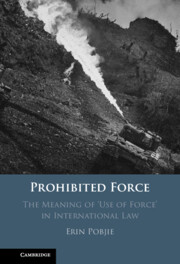Acknowledgements
This book began as my PhD thesis and has accompanied me along the way from Zürich to Cologne, Heidelberg and, finally, Colchester. I’m very grateful for the support of everyone who helped me on my journey, starting with Noam Lubell, who sparked my interest in jus contra bellum in an inspiring first lecture on the law of armed conflict during my LLM degree at the University of Essex and who encouraged me to pursue a PhD. It is a privilege to now be his colleague and to teach that very same module alongside him. Noam was the one who introduced me to my future PhD supervisor, Claus Kreß, during a meeting in Cambridge of the International Law Association’s Committee on the Use of Force. During that Committee meeting, which I attended as a research assistant to the Rapporteur during my LLM, it was inspiring to listen to the experts whose books I had read and to discuss international law with them during the breaks – scholars whose work I have drawn on extensively in this book, including Claus, Michael Wood, Tom Ruys, James Green and Christian Henderson. It is a great honour to now be co-Rapporteur of the ILA Committee on the Use of Force and to continue these conversations and contribute to the discussion.
In German, a PhD supervisor is called a Doktorvater (or Doktormutter) and in the case of Claus Kreß, this expression captures the sense of academic family that he created at the Institute for International Peace and Security Law at the University of Cologne. Claus is an incisive and brilliant scholar, inspiring mentor and now friend, and this book would not have been possible without the opportunities he gave me and his invaluable guidance and support.
I also wish to thank the many scholars who have generously given feedback on early drafts and discussed my thoughts and ideas, including Christine Gray, Sarah Nouwen, Anne Peters, Christian Marxsen, Michael Byers, Gus Waschefort and Noam Lubell, as well as my friends and colleagues at the Institute for International Peace and Security Law at the University of Cologne, the Lauterpacht Centre for International Law at the University of Cambridge, the Max Planck Institute for Comparative Public Law and International Law in Heidelberg (in particular, the Max Planck research group Shades of Illegality in International Peace and Security Law) and at Essex Law School. During the writing process, I benefited from the generous support of the German Academic Exchange Service (DAAD), which funded my research fellowship at the Lauterpacht Centre in Cambridge, and the Max-Planck-Förderstiftung, which granted me a fellowship to spend one summer writing this book from the ancient farmhouse of the scientist Max Planck overlooking Lake Tegern and the Bavarian Alps. I would also like to thank the University of Essex for generously supporting the open access publication of this book.
Family and friends supported, encouraged and inspired me throughout the PhD. I am particularly grateful to my mother, Tessie, and to Tim Sykes, who sprinkled in many adventures along the way. The writing of the book was also marked by sadness, as my father Warren passed away one day before my viva. The day I was awarded the PhD was one of the saddest and happiest of my life, and I am grateful for the support of my family, friends, Claus and my colleagues in Cologne, who surrounded me during those moments and beyond.
Finally, I would like to thank the editorial team at Cambridge University Press, especially Tom Randall and Marianne Nield, for their capable efforts in bringing this book to life.

